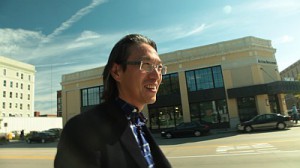
ArtPrize, by any measure, is a successful venture. It allows artists to reach a huge audience, gives hundreds of thousands of people the chance to experience a variety of art, and gives the city of Grand Rapids a terrific financial boost. There are, though, thoughtful critiques of the ArtPrize experience.
Mako Fujimura, whose “Walking on Water – Azurite” was showcased at the Acton Building during ArtPrize 2014, is concerned about some aspects of ArtPrize. He wrote about his experience on his website, in a piece entitled, “Toward Culture Care: Why the ArtPrize helps artists…and why it does not.” While his overall experience with ArtPrize was positive, Fujimura is particularly concerned that artists, who he says are by nature introverts, need care during what can be an overwhelming event.
In many artists I have spoken to, even on the second day of the ArtPrize, I could sense reluctance, and worn out souls. They have spent all their savings, all their vacation time, and they were here in person to speak to many people as possible to get the votes. I got exhausted just speaking to them.
With a few Jeff Koons-like exceptions, for the most part artists are introverts. Artists actually enjoy being alone in a studio, working without any recognition. And they have worked extra hard to prepare for this extravaganza, often traveling from afar…
These artists need to be cared for. They need an “Artist Care” package affirming their sacrifice to even get to the ArtPrize. The fact that the artist is exhibiting is surely a victory of some kind. Perhaps restaurants could give introverted artists, exhausted from greeting people, corner tables-or even vouchers. Grand Rapid is benefiting economically from the ArtPrize, and given that it cannot take place without artists participating, then that benefit must be shared with artists. But rather than giving artists checks, we should invest in facilitators to assist artists with the infrastructure and provide pragmatic help to get them to the next level. The goal of ArtPrize should be to take care of artists so that they can grow and create better art, toward the flourishing of culture, rather than the bottom line of entrepreneurial economic success.
He says that ArtPrize does afford the chance for emerging artists to be mentored by more established ones, and that the artists do need to reach out to each other during ArtPrize. The economic benefits of ArtPrize are important, and it gives artists an unprecedented audience. From a cultural perspective, Fujimura wants us to look past the huge crowds and carnival-like atmosphere:
Let’s learn from each experience, and grow to create better, enduring art. I was encouraged to see thousands of children lined up to see art; they are a future audience for art. ArtPrize has given me an opportunity to enjoy the beautiful fall skies of Grand Rapids, and, in my case, to be hosted graciously at Acton. I am deeply grateful. ArtPrize has the potential to be a game-changer in the world of art. What I do not want it to become is another American Idol. What I desire to see is a flourishing community of artists and art lovers who see art as a joyful gusher of gifts flowing into our cities. May the beautiful strangeness of art continue to fill every street of Grand Rapids; and may we see the next generation filled with imaginative children who know that their expression can create a better city.
Read “Toward Culture Care: Why the ArtPrize helps artists…and why it does not” at Makoto Fujimura’s website.